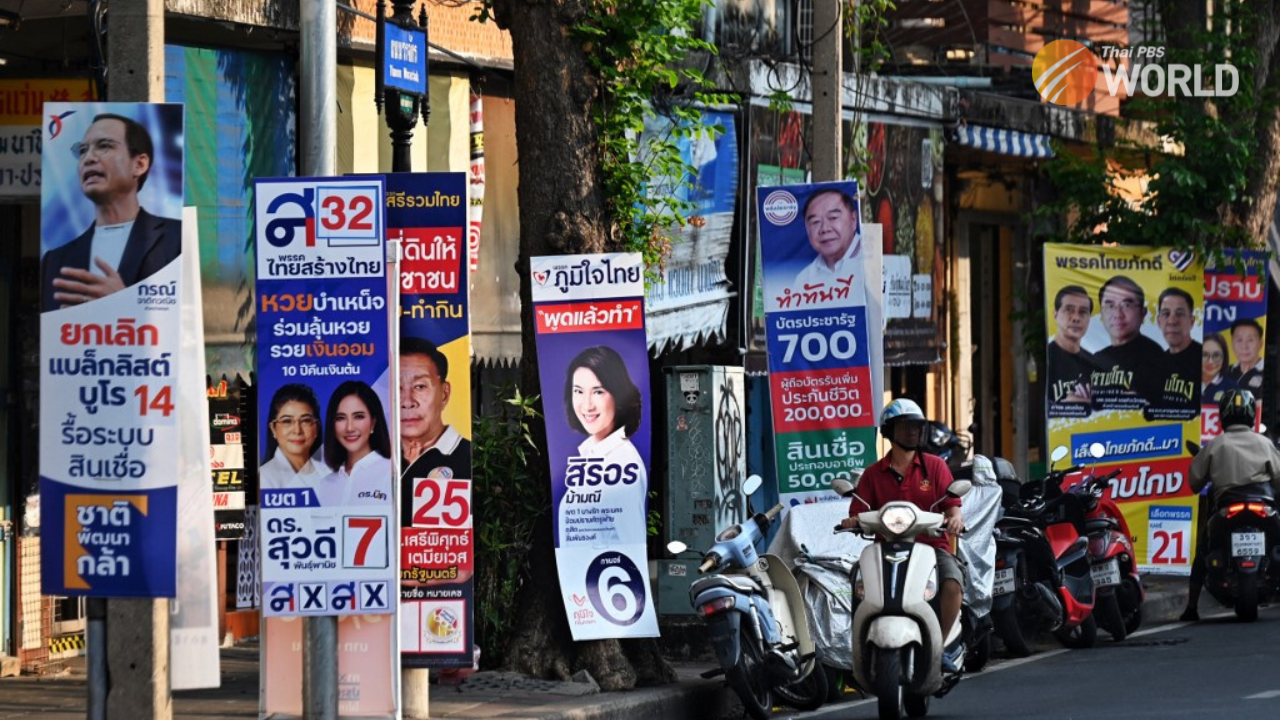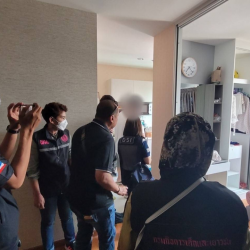Reading the story of Thailand’s election in campaign posters

Despite the rise of social media, campaign posters still seem to be the main channel of communication for political parties and candidates going all out to woo voters as election day approaches.
Hundreds of thousands, if not millions, of election posters nationwide are competing for the attention of passersby. In Bangkok, it is difficult to find a roadside power pole or signpost that is not displaying a campaign poster. Practically all prominent spots in the city are occupied by election posters.
The posters mainly declare what voters will get if the candidate and their party are elected to form the next government.
Promises range from a 10,000-baht handout for every citizen aged 16 and above, a monthly 3,000-baht “citizen’s pension”, and cheaper electricity to lower income taxes and up to a three-year suspension of debt repayments.
Practically all political parties contesting in next Sunday’s election are bombarding voters with offers of financial gain and other benefits that will cost the state billions of baht to implement.
Under criticism
Former election commissioner Somchai Srisutthiyakorn, who now leads the Thai Liberal (Seree Ruam Thai) Party’s strategist team, pointed out that the 3,000-baht monthly “citizen’s pension” alone would cost 298 billion baht per year if it covers the 8.3 million people aged 65 and over. This bill would surge to 432 billion baht per year if the 12 million people aged 60 and above are covered.
This and other so-called populist policies are being slammed by academics and technocrats as “irresponsible” and “a danger” to the country’s financial and budgetary discipline. They warn of heavy national debts if such policies are implemented.
Yet many political parties are ignoring these warnings, as promises of financial benefits appear to work well in wooing the voting public.
Even academics admit that populist policies attract votes more easily. Assoc Prof Viengrat Nethipo, of Chulalongkorn University’s Faculty of Political Science, said many voters favor populist platforms as they anticipate personal gains from the benefits offered by the political parties involved.
“These voters believe anything offered to them is good,” she said.
Super Poll predicts Pheu Thai will not win a landslide, but will win most seats
Early start
Campaign posters began popping up along roads around Bangkok as early as December – long before the House of Representatives was dissolved on March 20 and May 14 chosen as the date of the election the following day.
The early-bird posters advertised benefits offered by different parties. For instance, Pheu Thai’s early posters promised cuts in utility and fuel bills as well as 20 million new jobs with a minimum annual income of 200,000 baht. The party also pledged to increase the minimum daily wage to 600 baht and ensure new graduates are hired at a starting salary of 25,000 baht.
The party later came up with more promises, including a 10,000-baht handout via e-coupon in digital wallets, which it emblazoned on posters of its election candidates.
Bhumjaithai Party’s banners, meanwhile, offered interest-free loans with three-year repayment terms, while the Democrat Party promised to fund every “community/village bank” with 2 million baht.
Joining the bandwagon
Even Move Forward Party, which has campaigned for serious issues like reforming the military and amending the lese majeste law, felt compelled to make financial offers that they called “welfare benefits to reduce inequality”.
The party promises monthly allowances of 1,200 baht for small children and 3,000 baht for the elderly, as well as an “immediate increase” in the minimum daily wage to 450 baht. The minimum daily wage currently ranges from 313 to 336 baht depending on the province.
Depending on Prayut
The United Thai Nation Party, meanwhile, appears to be relying on the achievements of the outgoing Prayut Chan-o-cha government. Its posters hail the success of many policies employed by Prayut’s administration, such as the co-payment scheme implemented during the COVID-19 crisis.
In reality, United Thai Nation was formed as recently as March last year and Prayut only joined it in December after breaking his allegiance to the Palang Pracharath Party.
In its campaign posters, United Thai Nation promises “the return” of co-payment programs, plus a 30-billion baht “emergency fund for people” and cheaper electricity for low-income earners.
Never too small
Even smaller parties have jumped on the bandwagon to woo voters with financial promises, in the event they join the next ruling coalition.
Chart Pattana Kla promises to reduce personal income tax and even waive it for those earning 40,000 baht or less per month.
The Thai Liberal Party’s poster promises cheaper fuel and electricity, plus a 3,000-baht per month “people’s pension”. Thai Sang Thai is also offering the same pension and cheaper electricity rates.
New Palang Dharma, meanwhile, is declaring “no debts for farmers” on its posters, while New Way Party is promising a 3,000 baht “monthly salary” to university students. The aim of the latter is “to ease the burden on parents and guardians”.
The For the Nation Party, meanwhile, pledges wages for student interns.
Election Commission under fire over poor regulation of populist campaign policies
More serious issues
Apart from offering financial incentives, parties also touch upon more serious issues via their campaign posters.
The Thai Liberal Party promises to reform the armed forces, abolish conscription and streamline the military, as well as eradicate the problem of narcotics.
Palang Pracharath’s banners promote its policy platform of “moving on from political conflict”.
Chartthaipattana’s campaign posters announce that “New-generation farmers can sell carbon credits” – reflecting the party’s eco-friendly platform.
Some parties, meanwhile, swear to bring huge changes to the country. For instance, Move Forward’s posters proclaim that “Thailand will not be the same again” if it wins power, while Pheu Thai pledges “immediate changes” for the country if it secures a landslide victory.
Holier than thou
Some parties, meanwhile, are flinging jibes at their rivals via their campaign posters.
Thai Sang Thai, for instance, targets other parties’ empty rhetoric with its slogan, “we are not good at speaking as we focus on working”. Meanwhile, Pheu Thai’s posters declare “anyone can boast about good policies, but only Pheu Thai can deliver”.
The Zendai Party, a breakaway from Move Forward, yells on its posters: “Stop fooling people!” According to Zendai, the 3,000-baht monthly pension idea offers a bleak future for the new generation that will have to pay for it.
Instead, this newly formed party promises to get rid of Thailand’s deep-rooted patronage networks and amend laws to benefit “those who have no connections”.
By Thai PBS World’s Political Desk






